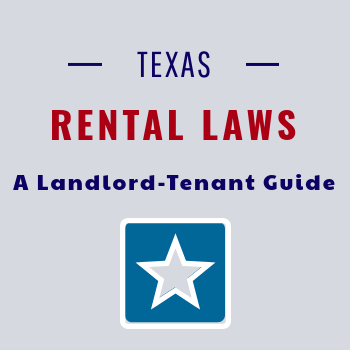
Good News! The research team at Rentec Direct is working to curate information and compose rental law resource guides by state.
Designed as a jumping-off point for landlords and property managers researching the regulations and statutes that apply to their state, these guides are built with residential property management in mind. These resource guides are provided as an overview and summary of the common regulations for landlord tenant law and do not take the place of, nor should be considered as legal advice.
Introducing Texas Rental Laws – A Landlord-Tenant Guide
Rentec Direct recently released a Texas Rental Laws guide for landlords and property managers.
The Official State Statutes and other reputable municipal sources were used to research this information. Resource links to the Texas Official State Statutes on Landlord-Tenant Laws and the Texas Tenants’ Rights Handbook or any other link provided have been included for your convenience.
The Importance of Landlord Rental Laws
Compliance with the law aside, there are other important reasons to know the statutes, laws, and regulations for managing properties.
Avoid Negative Consequences
There can be negative consequences for not having a firm grasp on the landlord tenant laws in your state. For example, according to the landlord tenant laws in Texas, if a landlord doesn’t account for and handle a security deposit return correctly, they may be liable for a $100 fine plus three times the security deposit held in error.
Establish Consistent Business Practices
Texas rental law is clear that rent is due on the first day of the month and is considered late the following day, which is not uncommon. However, interestingly, a late fee may not be imposed until two full days (day three) after the due date. Unless you understand the rental regulations in Texas, you might assess a late fee a day too early which may cause a lease agreement breech.
It goes to follow that knowing the late fee and grace period regulations for your state allows you to set up your property management software settings in compliance with that criteria to save you time and money and a potential legal battle.
Avoid Favoritism or Discrimination
Having a clear understanding of landlord responsibilities vs. tenants’ rights allows a landlord to avoid favoritism. Favoritism, or even simply conducting business in an inconsistent manner, could be misconstrued as discrimination.
Create Professional Landlord Tenant Relationships
Tenants appreciate knowing what to expect, such as how often a rental will be inspected or when a late fee might be imposed. Clear boundaries are important to avoid misunderstandings and foster the tenant landlord relationship. Knowing what a landlord cannot do is just as important as knowing what is allowable and will help to build trust — and hopefully, decrease tenant turnover.
Covered in the State Rental Law Guides
The guides cover an overview of landlord tenant law for the following categories:
- Security Deposits
- Rental Applications
- Rent
- Leases
- Landlord Responsibilities
- Property Maintenance and Repair
- Legal Disclosure Requirements
- Random Tenant Laws
In addition to linking to the state statutes, the guides provide resource links for landlords to continue their research for detailed information. Helpful links on topics such as the Fair Housing Act, Housing Discrimination, EPA Lead Disclosure Information, etc are also included.
The Rentec Direct research team reminds landlords and property managers to keep an eye out for additional state rental law guides to be released and to always consult the official statutes and/or legal counsel for further guidance and clarification.







What a delightful blog! will be returning to this site from time to time in search of more captivating content. It would be great if the writer will keep us informed of any fresh developments.
Appreciate the practical tips. Very useful and clear.
The tenancy laws in Texas are very good and should be implemented in every country. There should be a system of justice.
The tenancy laws in Texas are very good and should be implemented in every country. There should be a system of justice.